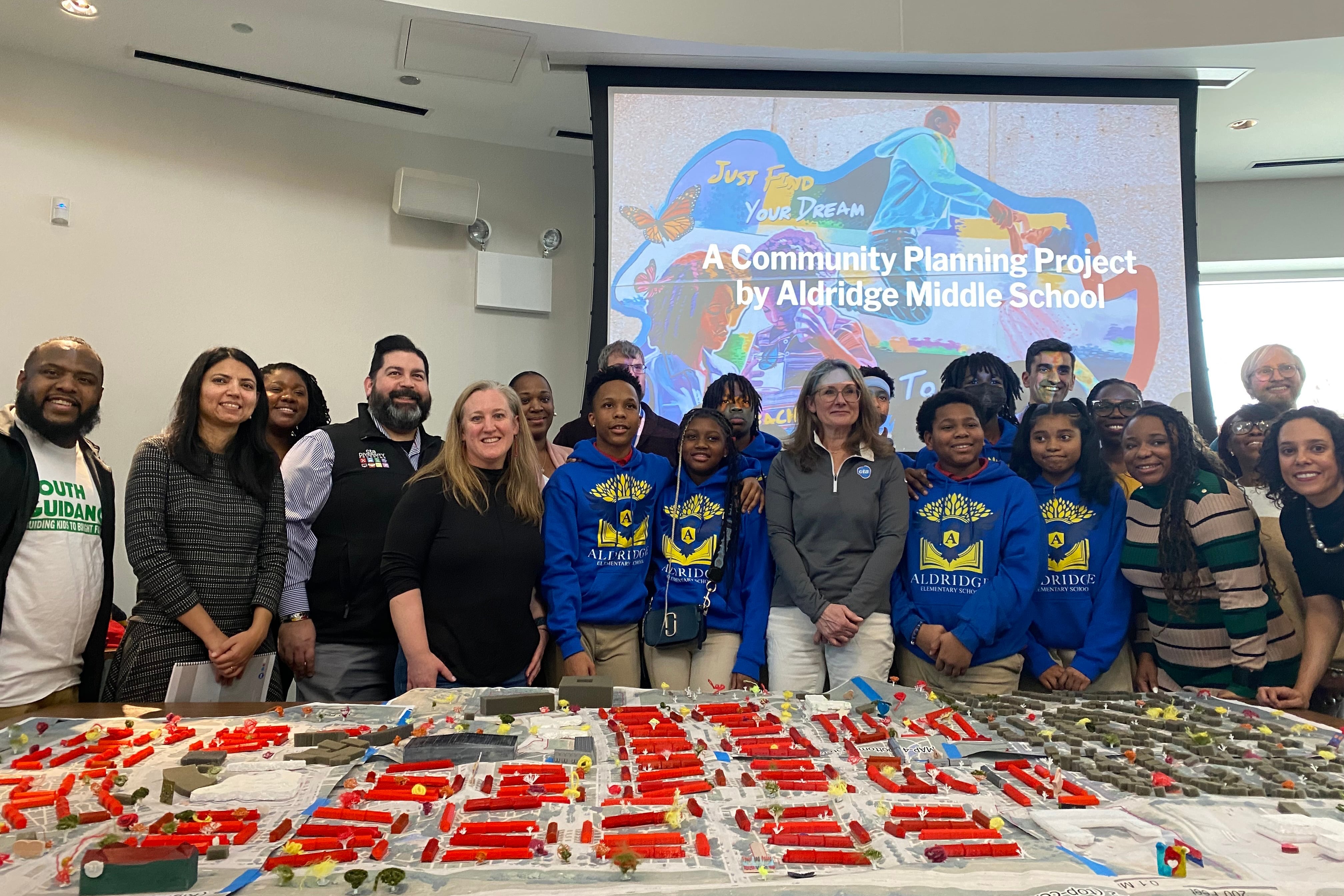Sign up for Chalkbeat Chicago’s free daily newsletter to keep up with the latest education news.
Standing next to a 3D model of the Altgeld Gardens neighborhood spread across a conference room table, eighth grader Rondell Sims gave a call to action to a room of city officials and classmates.
“As development comes to our community, you all will be advocates alongside in creation of a plan that is for us, by us,” Rondell said during a presentation on Wednesday inside the Altgeld Gardens Chicago Public Library Branch.
Rondell and his fellow middle schoolers at Aldridge Elementary were laying out a vision for the future of Altgeld Gardens that would include a grocery store, a new recreation center, public art by a planned new public transit stop, and a museum to honor Hazel Johnson, the “mother of the environmental justice movement” who lived in the neighborhood and fought against air pollution and toxic conditions in the community.
“You can’t really speak on something that you don’t live,” Rondell said after the formal presentation ended. “I feel like by us adding these things to the community and making more things that will be better for the people that’s in the community is just amazing. It will give a better name for our community.”
The project — that allowed middle schoolers to play the role of city planner and propose changes to their community — is the culmination of more than two years of collaboration between Aldridge teachers and the Field Museum.
“The work that we do in schools can’t just be isolated to grades,” said Principal Afua Agyeman-Badu. ”I wanted them to see the power that exists within them to make decisions and create a plan about what it is that they want for this place.”
Built in 1945 by the Department of Housing and Urban Development to house Black veterans returning from World War II, Altgeld Gardens is a planned community made up of mostly three-story townhomes operated by the Chicago Housing Authority.
The neighborhood — near the site of the old steel mills and the Pullman factory — sits 19 miles from Chicago’s Loop at 130th Street and has no access to the city’s public transit system, which ends at 95th Street. City officials have been talking about extending the Red Line for decades, but the project now appears on the cusp of becoming a reality.
Agyeman-Badu said the Red Line extension project is a learning opportunity for Aldridge students.
“I want them to be able to one day see when the ribbon is cut for them to see their ideas as a part of that plan for the Red Line extension,” Agyeman-Badu said.
Raven Mayo, Aldridge’s middle school science teacher, said the students have been working on this project since sixth grade and it’s evolved over time. The news of the Red Line extension prompted engaging discussions in class when students questioned why the community doesn’t have access to public transit and is isolated from the rest of Chicago.
“This created an opportunity for them to share their gripes in a productive way,” Mayo said. “Like this is what we deserve, just like the rest of the city.”
“The kids are speaking, they have a voice, their voice matters, their desires matter, they’re the future.” Mayo said. “In the next five years, they’ll be working adults, and they need to have access to get it downtown and to be a part of the workforce in Chicago.”
Bill Mooney, chief infrastructure officer for the Chicago Transit Authority, and other city officials attended the presentation on Wednesday to give feedback and take notes.
“This is one of the coolest things I’ve been able to participate in my 26 years at CTA.” Mooney said. “We are in a unique moment. Not often does what’s right, and what’s possible align.”
He urged the students to keep fighting to bring their ideas to fruition. The Red Line extension project cleared a hurdle last fall in the process to secure nearly $2 billion in federal funding, but the final award won’t be determined until late 2024. It’s not expected to be completed until 2029.
Jasmine Gunn, a city planner for the Far South Region with Chicago’s Department of Planning and Development, said often community meetings draw an older demographic, so it was refreshing to see the youth perspective.
“They’re gonna be living in this community longer than any of us,” Gunn said. “To start any development, we need the vision and seeing their vision is really great. I’m actually trying to set up a field trip for our staff to come look at the presentation.”
Eleanor Sweeney, an educator with The Field Museum who works with the Aldridge students, said students are more likely to be engaged with learning when there’s a connection to their own lives. They also have so many good ideas.
“If anyone is making decisions about the future of their neighborhood, consult your local middle schoolers,” Sweeney said with a smile.
Terrence Perry, an eighth grader who worked on the public art piece of the project, said he’s hopeful that city officials will pick up some of their ideas.
“Once everybody sees it? They’re gonna be like, “Oh, I get what they’re trying to do,’” Terrence said. “A lot of people are gonna want to move out here.”
He stood near the 3D model on the conference room table and pointed to a tiny display near his home. It read: “Power and peace starts within me.”
Becky Vevea is the bureau chief for Chalkbeat Chicago. Contact Becky at bvevea@chalkbeat.org.







